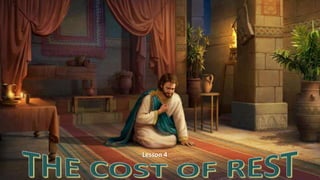
Lesson 4 - David's Sin and Repentance
- 1. Lesson 4
- 3. “When I kept silent, my bones became brittle through my groaning all day long. For day and night Your hand was heavy upon me. My strength was drained as in the droughts of summer.” (Psalm 32:3-4 TLV). Sin takes our rest away. Getting it back has a cost: repentance (Psalm 32:5). The story of David’s sin and repentance is a notable example of this process. I have sinned! What should I do? Conceal it? 2 Samuel 11 Confess it? 2 Samuel 12:1-13 Then what? Consequences of sin. 2 Samuel 12:14-23 A new heart. Salmo 51:1-12 New words. Salmo 51:13-19
- 4. “But the thing that David had done displeased the Lord.” (2 Samuel 11:27) David’s fall was a consequence of a chain of mistakes. He did not fulfill his duty as a king (v. 1) He did not turn away, but took pleasure in the temptation (v. 2; Job 31:1) He found a way to fulfill his desire (v. 3) He committed a sin (v. 4)
- 5. He tried to conceal his sin by fooling a good man (v. 5-12) He put Uriah in a dangerous position by getting him drunk (v. 13) He arranged a murder (v. 14-25) He tried to conceal his sin by marrying Bathsheba (v. 26-27) “But the thing that David had done displeased the Lord.” (2 Samuel 11:27) David’s fall was a consequence of a chain of mistakes.
- 6. “So David said to Nathan, ‘I have sinned against the Lord.’ And Nathan said to David, ‘The Lord also has put away your sin; you shall not die.’” (2 Samuel 12:13) God did not sit back and do nothing. He reacted to David’s flagrant sin by sending prophet Nathan. Nathan used a parable to touch David’s conscience, appealing to David’s sense of justice and his experience as a shepherd (v. 1-6). David’s repentance went beyond feeling guilt over his sin against Uriah and Bathsheba. He understood he had sinned against God (Psalm 51:4). Our sins ultimately hurt God and drive another nail into the rough beam pointing heavenward on Golgotha. Thanks to Jesus’ sacrifice, there is an immediate response to true repentance: “The Lord also has put away your sin.”
- 7. David was forgiven immediately, but God did not prevent the consequences of his sin. David sentenced himself to the loss of four of his sons: the first son of Bathsheba, Amnon, Absalom, and Adonijah. However, repentance also had consequences. David recovered “the joy of Your salvation.” (Psalm 51:12) God forgave an adulterer, manipulator, and murderer. Wouldn’t He forgive us too? God’s grace is so great that He is always willing to forgive us, no matter how serious our sins are.
- 8. “Create in me a clean heart, O God, and renew a steadfast spirit within me.” (Psalm 51:10) Only the Holy Spirit can change our hearts this way (v. 11). He leads us to sanctification, makes us new, strengthens us to resist temptation, and gives us rest. David asked God to erase his sins, to purify him, and to change his thoughts and feelings. He did not want to rely on himself anymore. We can have true safety, joy, and happiness by relying on God alone.
- 9. “Then I will teach transgressors Your ways, and sinners shall be converted to You.” (Psalm 51:13) David was ashamed of his sin. He did not forget that stain on his record. However, there was something greater than shame: forgiveness. He could not stay silent (v. 15). He had to warn others, so they did not make the same mistake. And they had to know that God was willing to forgive them if they had sinned. We cannot keep this important news secret: “If we confess our sins, He is faithful and just to forgive us our sins and to cleanse us from all unrighteousness.” (1 John 1:9)
- 10. “God’s forgiveness is not merely a judicial act by which He sets us free from condemnation. It is not only forgiveness for sin, but reclaiming from sin. It is the outflow of redeeming love that transforms the heart.” E. G. W. (Thoughts From the Mount of Blessing, cp. 5, p. 114)
- 11. Slideshare.net/chucho1943 We invite you to download and study each one of the 13 lessons about this serie: THIS SERVICE IS FREE AND YOU CAN USE IT
